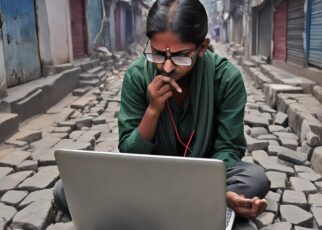In a recent report by Access Now, it has been revealed that India continues to lead the world in internet shutdowns for the sixth consecutive year. This troubling trend underscores significant challenges to digital rights and freedom of expression within the country.
According to Access Now’s data, India accounted for a staggering 53% of all recorded internet shutdowns globally since 2016, with 773 instances out of a total of 1,458 shutdowns. In 2023 alone, India witnessed 116 internet shutdowns, representing 41% of the 283 shutdowns reported worldwide during the same period.
The impact of these shutdowns extends beyond mere inconvenience, affecting India’s economy and social fabric. The report highlights that internet shutdowns cost the country approximately $1.9 billion in economic losses and led to a loss of $118 million in foreign investment in the first half of 2023 alone. Furthermore, a single-day shutdown can result in up to 379 people losing their jobs, exacerbating unemployment rates.
The detrimental effects of internet shutdowns are particularly severe in regions like Manipur, where 47 shutdowns occurred, and Punjab, which experienced a statewide shutdown in March. In Manipur, internet services were suspended for a staggering 212 days, making it challenging to document and address serious crimes, including gender-based violence.
The report also sheds light on the increase in prolonged shutdowns across India, with 41% of shutdowns lasting five or more days in 2023 compared to 15% in 2022. This trend reflects a concerning escalation of restrictions on digital access and freedom of expression.
It’s not just India facing these challenges. Myanmar and Iran closely followed India in internet shutdown occurrences in 2023, with 37 and 34 shutdowns respectively. The report underscores how authorities often leverage internet shutdowns to enable violence and exacerbate conflicts and atrocities.
Beyond conflict-related shutdowns, internet restrictions have also been imposed during protests, exams to prevent cheating, and even in response to natural disasters—an emerging trend identified by Access Now.
Moreover, the report highlights the widespread blocking of popular social media platforms like Facebook, Twitter, WhatsApp, and YouTube across multiple countries. The increasing frequency of platform blocks underscores growing restrictions on digital communication and information exchange globally.
Access Now’s report serves as a stark reminder of the critical importance of safeguarding digital rights and ensuring unfettered access to the internet for all. Addressing the issue of internet shutdowns requires collective action to uphold fundamental freedoms and promote an open and inclusive digital society, both in India and around the world.





